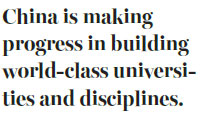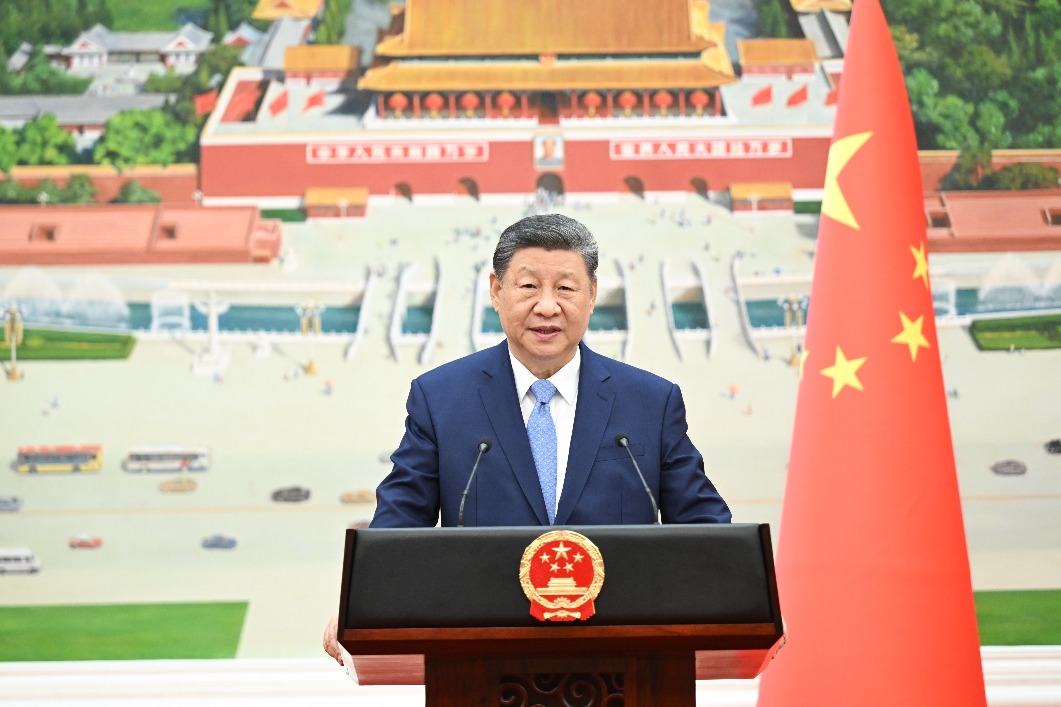Nation to boost standing in higher education

New plan aims to elevate a group of Chinese universities and disciplines to world-class level
The Ministry of Education and other government departments have jointly issued a plan to build world-class universities and disciplines, which is of great significance to realize the Chinese Dream and increase China's "soft power".
China's bid to create world-class universities started in the 1990s with the 211 Project. Launched in 1995, the project aimed to raise the educational standards of about 100 universities. It was followed by the 985 Project in 1998, which selected 39 universities from those included in 211 Project to be China's key universities to develop.
With sustained government investment and the efforts of the universities concerned, the two projects have made remarkable achievements in recent years, raising the international status of Chinese universities.
The new Double World-Class plan aims to raise a group of Chinese universities and disciplines to world-class level, which will provide strong support to achieve the great rejuvenation of the Chinese nation.
China has 2,880 colleges and universities and 37 million enrolled college students, and the plan is expected to help more Chinese universities besides Peking University and Tsinghua University squeeze into the ranks of the top 100 universities worldwide.
According to the Times Higher Education World University Rankings 2018, there are 43 US universities among the top 100 international universities, which indicates the United States is still a strong higher education power. Even those countries whose higher education scale and economic volume is smaller than China have more universities on the list: for example, the United Kingdom has 12 universities on the list, Germany has nine and Australia six.
Among the 137 universities in the Double World-Class plan, 42 are to be established as world-class universities, while 95 are to develop world-class disciplines.

The government is increasing investment to promote the construction of world-class universities and disciplines, and China is making progress in building world-class universities and disciplines.
But besides China, emerging economies such as India, Russia and Vietnam are also implementing plans aimed at making their universities world-class. However, as the world's second-largest economy, China has more economic strength to support the construction of world-class universities and world-class disciplines. According to the plan, the central government will allocate funds for the construction of world-class universities and world-class disciplines as well as the infrastructure to support them.
Furthermore, universities will gain strong motivation to improve the quality and standards of their education. Universities should first accept domestic evaluation by taking China's situation into consideration. President Xi Jinping has pointed out that China's world-class universities should have Chinese characteristics. Former vice-minister of Education Du Yubo has said China's higher education development should be closely connected with the actual objective and future direction of China's development, and the universities should serve the public, reform and opening-up as well as socialist modernization construction, and help consolidate and develop the socialist system with Chinese characteristics.
The universities should also accept international reviews based on quantitative assessment criteria, such as academic performance, research and studies, paper citations and their degree of internationalization. The construction of world-class universities and world-class disciplines should be dynamic and performance-oriented. The new plan to construct world-class universities and disciplines should be based on the results of assessments every five years.
In addition, the internationalization pace of China's higher education is to be accelerated. The universities included in the new plan will be motivated to attract more excellent overseas professors, scientific researchers and students, and to conduct communication and exchanges with high level foreign universities, such as exchange students, visiting scholars, mutual credit recognition and joint talent cultivation.
Meanwhile, universities on the list will deepen academic exchanges and scientific research cooperation with world-class foreign universities and academic institutions. They are also expected to deeply participate in major regional and international scientific research projects in order to attain international influence.
Thus, by the middle of this century, China is expected to be a power in higher education.
The author is a researcher at the Research Center for International Comparative Education of the National Institute of Education Sciences.
The views do not necessarily reflect those of China Daily.
(China Daily Africa Weekly 10/13/2017 page11)
Today's Top News
- Xi: Nation to expand opening-up
- China sees over 33.7 billion inter-regional trips in H1
- BRICS justifiably calls for IMF reforms
- Xi receives credentials of new ambassadors to China
- Sino-US trade talks key to global supply chain
- Medical insurance covers 95% citizens






























